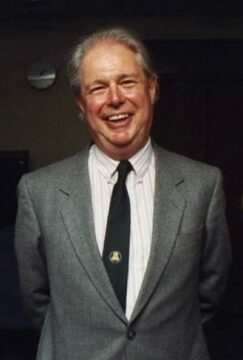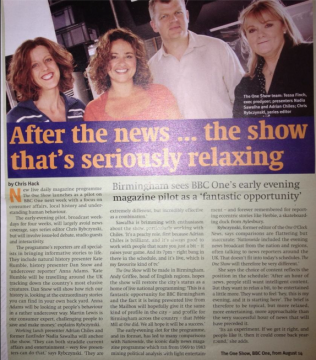Actor Warren Clarke died 12 Nov, aged 67, after a short illness. Warren Clarke appeared in several BBC Pebble Mill dramas including: Battle of Waterloo 1983, Nice Work 1989, and perhaps most famously, Dalziel and Pascoe 1996-2007.
Warren was born in Oldham, and began acting at the Liverpool Playhouse. He appeared in the controversial, 1971, Stanley Kubrick film, A Clockwork Orange. He has been described as having a ‘hangdog’ expression, perfect for rather grumpy character parts, like Vic in Nice Work, and the detective, Dalziel, in Dalziel and Pascoe.
I remember seeing Warren Clarke at several Midlands, Royal Television Society Awards ceremonies, where he was frequently nominated, and often won awards – he seemed to enjoy a good party!
(Copyright on the photographs resides with the original holders, no reproduction without permission)

Warren Clarke and Haydn Gwynne. Nice Work

Warren Clarke, Battle of Waterloo

Warren Clarke, Nice Work

Warren Clarke, Colin Buchanan, Dalziel & Pascoe
The following comments were left on the Pebble Mill Facebook page:
Julia Jones: ‘Very sad. I worked with Warren on four series of Dalziel and Pascoe. He certainly did enjoy a party and was always a great supporter of Pebble Mill.’
Mark James Southall: ‘Was a great friend of Pebble Mill and was one who was always fond of the talent that was in the area.’
Chris Marshall: ‘Nice Work was fabulous and Warren Clarke was fabulous in everything he did.’
Steve Peet: ‘Was lucky enough to see the great man at work on D and P back in 2002/3, a complex soul and totally committed to the role, but in a sometimes difficult arena when you’re the trainee he found time for a chat and words of encouragement.’
Patricia Hodge Robinson: ‘He also starred in ‘The Locksmith’ with Chris Gascoyne and a very young John Simm. Made by Fair Game Films but staffed out of Pebble Mill. I have very fond memories of working with him on this and D & P. He leaves behind an impressive body of work and was an excellent character actor.’
Veronica Butt: ‘I went to meet Warren from B’ham New Street when he appeared as a guest on the pilot series of The One Show, created in Birmingham! He insisted we had a couple of drinks at the bar at the Malmaison before we went through! He was a lovely, down to earth man and a great actor.’
Nick Hennegan: ‘My partner was an actor in The Locksmith and a mentor produced D and P. He was a lovely man.’
Roulla Xenides: ‘He and Nigel Havers were guests on Pebble Mill together when they appeared as Soviet agents in the BBC1 comedy drama Sleepers in 1991. I remember we used some outtake clips of them talking in Russian. I think the series concept was Warren’s.’





